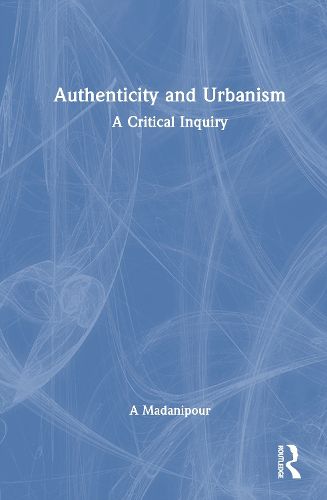Readings Newsletter
Become a Readings Member to make your shopping experience even easier.
Sign in or sign up for free!
You’re not far away from qualifying for FREE standard shipping within Australia
You’ve qualified for FREE standard shipping within Australia
The cart is loading…






This book investigates authenticity, an important but controversial cultural concept, and its relevance for urban socio-spatial processes. Defining authenticity as an evaluative relationship with an origin, it unpacks a range of origins from a critical, non-essentialist perspective: self, author, substance, event, time, place, and society.
Authenticity is a key concept in contemporary culture. It was selected as the word of the year 2023 by Merriam-Webster, it is significant for UNESCO in designating the world heritage, a philosophical battleground, and reflecting concerns about truth and trust in the digital age. This book offers a clear understanding of the concept and discusses its implications for urbanism, understood as both material and relational, both physical and social. It critically examines whether an authentic urbanism may be possible through seeking a solid ground in the self, in the act of making, in the substance of objects, in transformative events, in particular times and places, and in society and culture.
Analysing the complexities, nuances, and controversies of the concept of authenticity, and their implications for urban space and society, the book explores the promises and pitfalls of authenticity, looking for ways of avoiding its dangers and searching for its creative potentials. Students and scholars in urban studies, geography, urban design, planning and architecture, as well as in sociology and cultural studies would find this interface between ideas and practices informative and insightful.
$9.00 standard shipping within Australia
FREE standard shipping within Australia for orders over $100.00
Express & International shipping calculated at checkout
This book investigates authenticity, an important but controversial cultural concept, and its relevance for urban socio-spatial processes. Defining authenticity as an evaluative relationship with an origin, it unpacks a range of origins from a critical, non-essentialist perspective: self, author, substance, event, time, place, and society.
Authenticity is a key concept in contemporary culture. It was selected as the word of the year 2023 by Merriam-Webster, it is significant for UNESCO in designating the world heritage, a philosophical battleground, and reflecting concerns about truth and trust in the digital age. This book offers a clear understanding of the concept and discusses its implications for urbanism, understood as both material and relational, both physical and social. It critically examines whether an authentic urbanism may be possible through seeking a solid ground in the self, in the act of making, in the substance of objects, in transformative events, in particular times and places, and in society and culture.
Analysing the complexities, nuances, and controversies of the concept of authenticity, and their implications for urban space and society, the book explores the promises and pitfalls of authenticity, looking for ways of avoiding its dangers and searching for its creative potentials. Students and scholars in urban studies, geography, urban design, planning and architecture, as well as in sociology and cultural studies would find this interface between ideas and practices informative and insightful.